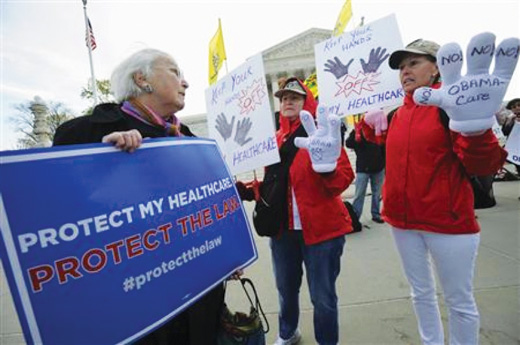 Thursday, March 29, 2012 at 10:09AM |
Thursday, March 29, 2012 at 10:09AM |  Post a Comment
Post a Comment Geoff Dutton | in
Geoff Dutton | in  Consumer Power,
Consumer Power,  Current Events,
Current Events,  Well-Being
Well-Being
Yes, you read that right, only two percent of Americans would be forced to either buy health insurance under the ACA (Affordable Care Act of 2009; it may be a cynical euphemism, but I refuse to call it "ObamaCare") or pay the full tax penalty for not doing so. According to a new Urban Institute study (brief PDF), 7.3 million people, two percent of the total population (or three percent of the population under age 65) would have to pay full tax penalties if they choose not to buy health insurance. The penalty amounts to well under half of the social security tax they would also have to pay on their incomes. Once they pay, they are free to remain uninsured until next year, but will then face another penalty if their income doesn't sag.
Basically, only certain people who file tax returns are subject to the penalty. Those who are not obligated or who fail to file federal taxes aren't penalized. The former because they are eligible for insurance programs or subsidies, the latter because they choose to be tax outlaws (and suffer worse consequences if caught). Furthermore, being assessed a health insurance tax penalty does not make one a criminal; once they pay the penalty, that is the end of the matter. So, nobody is really being forced to buy health insurance, but at least 98% of people will likely have it in any event. All this makes the current debate in and around the Supreme Court (about whether compelling individuals to enter into contracts to purchase health insurance is constitutional) pretty much moot, as far as I can tell.
Coverage of the circus circled around the Supreme Court building almost entirely avoids telling us these facts. But the press is starting to echo the two percent meme, the truth of which depends on the veracity of Urban Institute's policy simulation study, which I can't vouch for. But, whether it turns out to be two, six, eight, ten percent or more, only those people should have standing to challenge this ACA provision. And, as they aren't really being forced to buy insurance, I guess they must actually be objecting to paying for something they don't use. To me, this is like occasional gripes from local taxpayers about being forced to pay taxes to support public schools when he or she has no kids who use them. They either don't get what a polity is about or they want to scam the system. Such individualistic thinking is one thing that makes America special and especially embarrassing to me when foreigners ask me to explain it.
Germans, for example, don't understand America's resistance to universal coverage. According to PRI's The World, Germany has had it since the 19th century. It is very popular and is definitely not socialized medicine. Under the system, Germans get to choose from among 145 non-profit private insurers. The board of directors that oversees the insurance program includes no insurers, government politicians or bureaucrats; its members represent employers and workers. There's no carping about freeloaders because everybody has a stake in the system. Oh, and the program is running a four billion euro surplus. Sigh.
Besides politics, the real reason that the ACA is in court is that it is a flawed and cumbersome law. It tries to reform health care by further privileging private health insurance companies while failing to address factors driving America's health care costs through the roof. It attempts to solve the wrong problem (access to health insurance, instead of access to affordable quality health care) using the wrong mechanism (the chaotic, balkanized and inefficient health insurance market). The system is clearly out of control when U.S. health care costs rise 3.3 times faster than incomes and 4.4 times faster than overall inflation, as this infographic from simplee.com shows.
Making affordable and effective health care available to all is a much bigger problem than can be solved by fiddling around with who pays for it. We need to apply brakes to the drivers of health care costs (unnecessary procedures and overuse of expensive technology and medicines). If we can't, the nation will be bankrupted by medicine. ACA pretty much punted on that responsibility.
All this fuss could have been avoided if Congress had set up a single-payer system administered or coordinated by the Federal Government. In its simplest form, this would open up Medicare to all. As Medicare is clearly constitutional, the farcical fracas we see in the courts now would never have erupted. But no, America has to do things in its own convoluted and ill-conceived ways.
In its wisdom, I hope the Supreme Court will pronounce that the ACA:
What do you think are the chances of that?
By Geoff Dutton
Top photo credit: Reuters/Jonathan Ernst
 Thursday, March 29, 2012 at 10:09AM |
Thursday, March 29, 2012 at 10:09AM |  Post a Comment
Post a Comment Geoff Dutton | in
Geoff Dutton | in  Consumer Power,
Consumer Power,  Current Events,
Current Events,  Well-Being
Well-Being
Reader Comments